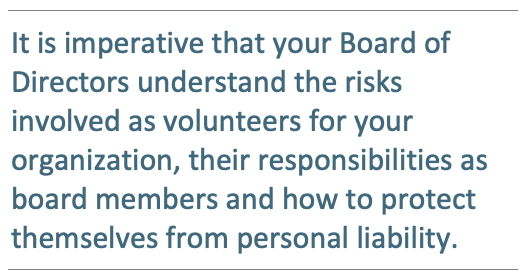 Nonprofit organizations provide essential social services that benefit communities and their members. These organizations cannot survive without a solid volunteer Board of Directors assigned to elect officers, adopt policies and make major financial decisions for the organization. Although the members of the board are volunteers, there is a certain amount of risk involved in holding one of these positions. Specifically, even when acting in good faith, board members are subject to personal liability, which may affect their personal financial status because of their business decisions.
Nonprofit organizations provide essential social services that benefit communities and their members. These organizations cannot survive without a solid volunteer Board of Directors assigned to elect officers, adopt policies and make major financial decisions for the organization. Although the members of the board are volunteers, there is a certain amount of risk involved in holding one of these positions. Specifically, even when acting in good faith, board members are subject to personal liability, which may affect their personal financial status because of their business decisions.
Therefore, it is imperative that your organization and Board of Directors understand the risks involved as volunteers, their responsibilities as board members and the ways in which they can protect themselves from personal liability.
Risks and Responsibilities
To combat the chance of affecting the personal liability of board members, nonprofit organizations should assess the risks involved with holding these positions. Your organization should first develop a volunteer risk management committee to identify all risks and pose solutions to minimize potential harm. In addition, you need to ensure that the board members understand their governance responsibilities. Your nonprofit should educate its board on their legal duties, fiduciary duties and decision-making roles. Furthermore, the risk committee should ensure the following:
- The organization is working within its stated mission
- Funds are spent according to the mission and spending decisions are known to donors
- The organization does not accept donations with conditions
- Individuals with personal agendas are not allowed to sit on the board
- Board members are not using professional contacts in dealings with the nonprofit

Once the risks are assessed and the Board of Directors is aware of those risks, they must also understand the responsibilities associated with the positions they hold. Legally, board members have three main duties:
- Duty of Care: The individual should act in the way that a reasonable person would in a similar position and under similar circumstances. Acting under good faith is an essential part of the functions of the board.
- Duty of Loyalty: The individual should place the organization’s financial interests as the primary responsibility. As a board member, one should not use their position for personal gain, financially or otherwise. In addition, individuals should remain honest about business ventures that pose a conflict of interest when acting as a representative of the organization.
- Duty of Obedience: The individual should try to further the mission of the nonprofit by supporting board decisions and implementing policies as they are outlined.
In addition to these responsibilities, board members must also ensure that the non-profit follows all tax requirements, complies with anti-trust laws, abides by civil rights laws and manages funds effectively.
Protections
Since there are risks involved with being part of a nonprofit Board of Directors, there are several protections available to minimize personal liability. First, there are federal and state statutes designed to protect individuals acting in good faith. The federal Volunteer Protection Act provides shielding for individuals acting on behalf of an organization within the scope of their position, as long as the actions are not criminal, negligent or reckless. All state volunteer protection statutes must provide at least the amount of protection that the federal law provides.
Secondly, most nonprofit organizations have indemnification provisions in their bylaws. These provisions explain that the organization will cover the legal expenses accrued in the event of a lawsuit. However, if the organization does not have excess funds, it may not be able to support this provision. In addition, if the board member was not acting in good faith, the provision becomes null and void.
Thirdly, nonprofit organizations should strongly consider purchasing insurance to cover their board members in situations that fall outside of the indemnification provisions or in the event that their financial situation does not allow them to cover extensive legal expenses.
Nonprofits should consider the following policies:
- Commercial General Liability (CGL): Protects volunteers and employees from bodily injury and personal injury claims.
- Workers Compensation: Some states allow organizations to cover volunteers in the event that they are injured while on the job.
- Automobile Liability: Coverage is needed for volunteers operating vehicles while working on behalf of the organization.
- Directors’ and Officers’ Liability (D&O): Protects directors and officers against employees, clients and community members serviced by the organization. Specifically, D&O provides coverage for discrimination, harassment and wrongful termination claims. Provisions within the Americans with Disabilities Act of 1990, the Family and Medical Leave Act of 1993 and the Civil Rights Act of 1991 have led to claims against nonprofit organizations and their respective boards.
- Personal Liability
As representatives of the nonprofit, directors and officers need protection, as they will be held liable along with the organization in the event of any wrongdoing.
Nonprofits should strongly consider D&O insurance since most individuals will not volunteer on a board with the knowledge that they are risking their personal assets in the event of litigation. Proper insurance coverage and other risk management strategies can help ensure that your organization and its Board of Directors are protected against liability. For more information about appropriate insurance coverage, contact Anchor Insurance Agencies at 800.856.1012 today.


